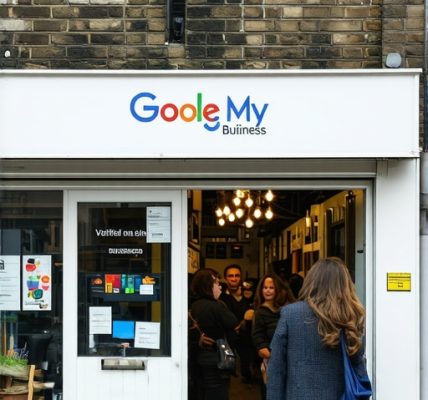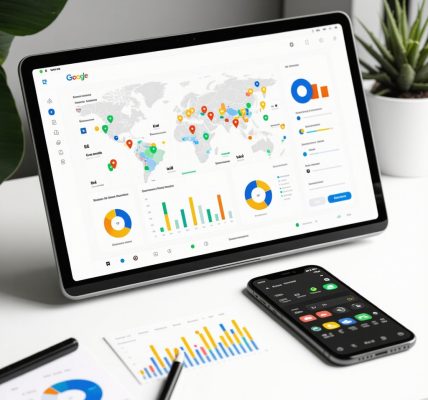Understanding the Importance of Keyword Strategy for Google Business
In the competitive landscape of local business, implementing a robust Google Business keyword strategy is essential for enhancing visibility and attracting potential customers. By leveraging the right keywords, businesses can significantly improve their chances of appearing in local search results, which is crucial in driving foot traffic and online inquiries.
Identifying Relevant Keywords for Your Business
The first step in formulating an effective Google Business keyword strategy is to identify relevant keywords that align with your offerings. Start by brainstorming terms and phrases that potential customers might use when searching for your products or services. Tools like Google Keyword Planner can help you uncover popular search terms and their associated search volumes.
Incorporating Local Keywords
Incorporating local keywords into your strategy is vital. These keywords often include specific geographic locations, such as neighborhoods, cities, or regions. For example, if you run a bakery in Austin, Texas, using keywords like “best bakery in Austin” or “Austin cake delivery” can help you target local customers more effectively. This approach can boost your chances of ranking higher in location-based searches.
Utilizing Long-Tail Keywords
Long-tail keywords—phrases that are more specific and typically longer—are essential for capturing niche markets. For instance, instead of targeting the broad term “bakery,” consider using a long-tail variant like “organic birthday cakes in Austin.” Such keywords often have less competition and can lead to higher conversion rates as they attract users who are further along in the buying process.
Optimizing Your Google Business Profile
Once you have identified the right keywords, the next step is to optimize your Google Business Profile accordingly. Ensure that your business name, address, and phone number (NAP) are consistent across all platforms. Make sure to include your primary keywords in your business description, services, and posts. This not only helps with search visibility but also provides potential customers with relevant information about your business.
Regularly Updating Your Content
To maintain a strong keyword strategy, regularly updating your Google Business profile is crucial. Google favors fresh content, so posting updates, promotions, and engaging content can help keep your audience interested and improve your ranking. Utilize insights from your GMB insights to understand what content resonates with your audience and adjust your keyword strategy accordingly.
Tracking and Analyzing Performance
Finally, tracking the performance of your keyword strategy is essential for ongoing success. Use tools like Google Analytics and Google Search Console to monitor traffic, engagement, and conversion rates from your Google Business profile. This data will help you refine your strategy, ensuring that you are continually optimizing for the most effective keywords.
Enhancing Your Google Business Profile with Keywords
After optimizing your Google Business Profile with relevant keywords, the next step is to ensure those keywords are effectively integrated into your content. This means using keywords in your business description, services offered, and posts. By weaving these keywords naturally into your text, you enhance your profile’s discoverability while providing potential customers with valuable information about your offerings.
Crafting Engaging Google Posts
Google posts are a great way to communicate with your audience and keep your content fresh. Each post should incorporate your target keywords organically. For example, if you are promoting a seasonal special, include phrases like “limited-time offer for organic cakes in Austin” within the post. This not only boosts SEO but also captures the attention of users searching for related content.
Utilizing Reviews to Boost Keyword Presence
Encouraging your customers to leave reviews can significantly impact your local SEO efforts. When customers write reviews using specific keywords, such as “best bakery in Austin,” it naturally enhances your visibility for those terms. To leverage this, you can guide customers by suggesting they include particular keywords in their reviews. This strategy not only boosts your keyword presence but also builds social proof and credibility.
Monitoring Keyword Performance
Monitoring the performance of your selected keywords is vital for continuous improvement. Use tools like Google Analytics and GMB insights to track how well your keywords are performing in terms of visibility and engagement. Look for trends in clicks and impressions, which can provide valuable insights into which keywords are driving traffic to your profile.
Adjusting Your Strategy Based on Data
As you analyze the performance of your keywords, be prepared to adjust your strategy. If certain keywords aren’t performing as expected, consider experimenting with synonyms or related phrases. For example, if “cake delivery in Austin” isn’t yielding results, you might try “Austin cake delivery service” instead. Regularly updating your keywords based on performance data ensures that your strategy remains relevant and effective.
Staying Updated with Google’s Algorithm Changes
Google frequently updates its algorithms, which can impact how your keywords perform. Stay informed about these changes by following reputable SEO blogs and forums. Understanding how updates might affect your visibility can help you adapt your strategy promptly. In addition, consider reading about local SEO strategies that align with Google’s latest guidelines to maintain your competitive edge.
Leveraging Local SEO Techniques for Better Visibility
Integrating local SEO techniques into your Google Business keyword strategy is essential for maximizing visibility. This involves not just using location-based keywords but also engaging in community events and partnerships that can lead to backlinks and mentions. The more your business is discussed in local contexts, the more likely you will rank higher in local searches.
Engaging in Community Events
Participating in local events can provide opportunities for networking and increasing your brand awareness. When you engage with your community, it often leads to organic mentions in local blogs and news outlets, which can enhance your SEO efforts. Be sure to highlight these events on your Google Business Profile by posting updates along with relevant keywords.
Building Local Backlinks
Backlinks from reputable local websites can significantly boost your site’s authority and improve your keyword rankings. Consider reaching out to local bloggers or news outlets to feature your business or guest post on their platforms. This not only provides valuable backlinks but also connects your business with potential customers in your area.
By implementing these strategies effectively, you will create a strong foundation for your Google Business keyword strategy. The combination of keyword optimization, active community engagement, and continuous performance monitoring will ensure your business remains visible and competitive in local searches.
Enhancing Customer Engagement Through Google Business Features
To truly maximize your Google Business profile’s visibility, it’s crucial to leverage the various features Google provides. Engaging with customers through these features not only enhances your online presence but also fosters trust and credibility. This engagement can be achieved through interactive elements such as customer reviews, Q&A sections, and Google posts that highlight your business updates.
Utilizing Google Posts Effectively
Google posts are an excellent way to keep your audience informed and engaged. By regularly posting updates, promotions, and events, you can maintain interest in your offerings. Ensure that these posts include relevant keywords that reflect your business and the services you provide. For example, if you are highlighting a new product launch, use phrases like “new organic bakery items available in Austin” to attract local search traffic. This approach not only boosts your SEO but also keeps your customers engaged with fresh content.
Encouraging Customer Reviews
Customer reviews play a pivotal role in shaping your online reputation. Encouraging satisfied customers to leave reviews can greatly enhance your keyword strategy. When customers mention specific products or services in their reviews, such as “best gluten-free cakes in Austin,” it reinforces your profile’s relevance for those keywords. To further enhance this, consider sending follow-up emails post-purchase, gently prompting customers to share their experiences on your Google Business profile.
Implementing Advanced SEO Strategies for Google Business
Beyond the basics, implementing advanced SEO techniques can further elevate your Google Business profile. These strategies encompass optimizing your business categories, ensuring you are listed in the correct niche, and utilizing local backlinks effectively.
Choosing the Right Business Categories
Google allows businesses to select primary and secondary categories that best describe their products or services. Selecting the most relevant categories is vital for enhancing visibility in local searches. For instance, if you operate a bakery that also offers catering services, ensure that both categories are chosen. This not only improves your chances of appearing in diverse search queries but also helps clarify your business offerings to potential customers.
Building Local Backlinks for Authority
Developing backlinks from reputable local websites is another powerful strategy to boost your Google Business profile. Collaborate with local bloggers, newspapers, or community websites to feature your business or contribute guest posts. This not only enhances your authority in the eyes of search engines but also drives traffic from relevant local sources.
Monitoring Your Google Business Insights
Regularly monitoring your Google Business insights is essential to understanding how your profile performs. These insights provide valuable data regarding how customers find your profile, what actions they take, and which keywords are driving traffic. By analyzing this data, you can adjust your strategy accordingly, focusing on high-performing keywords and improving areas that may be underperforming.
Adapting Strategies Based on Performance Data
As you track your performance, be ready to adapt your strategies. If certain keywords are driving significant traffic, consider creating additional content around those topics to further enhance visibility. Conversely, if specific keywords are not performing as expected, don’t hesitate to experiment with variations or related terms. This iterative approach ensures your keyword strategy remains relevant and effective as search behaviors evolve.
Utilizing Google Business Features for Maximum Impact
To further enhance your local SEO efforts, it’s essential to leverage the various features offered by Google Business. These features not only improve your visibility but also engage potential customers effectively. By using tools such as customer reviews, Google Posts, and Q&A sections, you can create a dynamic presence that attracts and retains customers.
Maximizing Engagement Through Google Posts
Google Posts are a powerful way to share updates, promotions, and events directly on your Google Business profile. Each post should seamlessly incorporate your target keywords while being informative and engaging. For instance, if you’re running a special event at your bakery, a post could highlight “join us for our seasonal cupcake tasting on Saturday!” This not only promotes the event but also improves your chances of appearing in relevant searches.
Encouraging Customer Interaction with Q&A Sections
The Q&A section on your Google Business profile is another valuable tool for enhancing user engagement. Potential customers often have questions about your products or services, and providing clear, informative answers can establish trust and authority. Use relevant keywords in your responses to improve your visibility. For example, if a customer asks about gluten-free options, a response could include details about your “gluten-free cake offerings in Austin,” reinforcing keyword usage while addressing customer needs.
Boosting Visibility with Customer Reviews
Customer reviews play a critical role in shaping your online reputation and improving local SEO. Encourage satisfied customers to leave reviews on your Google Business profile, as these reviews can enhance your keyword presence. When customers mention specific products or services, like “the best organic pastries in Austin,” it naturally boosts your profile’s relevance for those keywords.
Implementing Review Generation Strategies
To generate more reviews, consider sending follow-up emails to customers after their purchase, thanking them and inviting them to share their experiences. You could also create a strategic plan to ask for reviews during customer interactions, such as at the checkout or after service completion. This approach not only strengthens your keyword presence but builds social proof, enhancing your overall credibility.
Responding to Reviews for Better Engagement
Engaging with customer reviews—both positive and negative—demonstrates your commitment to customer satisfaction. Take the time to respond to reviews, thanking customers for their feedback and addressing any concerns. This interaction not only fosters loyalty but can also improve your overall ranking in local search results.
Using Insights to Refine Your Strategy
Regularly analyzing your Google Business insights is crucial for understanding how well your strategies are performing. Insights provide valuable data on customer interactions, including how they found your profile, which actions they took, and which keywords are driving traffic. This data can guide your ongoing strategy adjustments.
Identifying Trends and Adjusting Accordingly
By examining trends in clicks and impressions, you can identify which keywords are most effective and which may need to be replaced or refined. If certain keywords consistently bring in traffic, consider creating additional content, such as blog posts or FAQs, to further capitalize on those terms. Conversely, for underperforming keywords, experiment with variations or related phrases to see if they yield better results. This continuous optimization will keep your strategy relevant and effective.
Implementing Advanced Techniques for Greater Visibility
For businesses looking to take their Google Business optimization to the next level, implementing advanced SEO techniques is key. This includes ensuring your business categories are correctly selected, engaging in local backlink strategies, and utilizing community involvement to boost your profile’s authority.
Choosing Appropriate Business Categories
Selecting the right categories for your Google Business profile is essential for enhancing your visibility in local searches. Ensure that your primary and secondary categories accurately reflect your offerings. For example, a bakery that also provides catering services should select both “Bakery” and “Catering Service” as categories. This clarity helps Google match your business to relevant searches, increasing your chances of appearing in local results.
Frequently Asked Questions about Google Business Keyword Strategy
1. What is a Google Business keyword strategy?
A Google Business keyword strategy involves selecting and optimizing keywords related to your business that potential customers use in search engines. This helps improve visibility in local searches, driving traffic to your Google Business profile.
2. How do I find the right keywords for my Google Business profile?
You can find the right keywords by brainstorming terms relevant to your products or services, using tools like Google Keyword Planner, and analyzing competitors to see what keywords they are ranking for.
3. Why are local keywords important for my business?
Local keywords are crucial because they help target customers in your geographic area. For instance, using phrases like “best coffee shop in Austin” can attract local customers searching for relevant services nearby.
4. How often should I update my Google Business profile?
It’s advisable to update your Google Business profile regularly, at least once a month. Posting updates, new offers, or events can keep your content fresh, which Google favors for ranking.
5. What role do customer reviews play in my keyword strategy?
Customer reviews can significantly enhance your keyword strategy because when customers mention specific keywords in their reviews, it helps improve your business’s relevance for those terms, boosting local SEO.
6. Can I use long-tail keywords in my Google Business strategy?
Absolutely! Long-tail keywords are more specific phrases that often have less competition, making it easier to rank for them. For example, “vegan bakery in Austin” is a long-tail keyword that can attract targeted traffic.
7. How can I monitor the performance of my keywords?
You can monitor keyword performance using tools such as Google Analytics and Google Search Console. These platforms provide insights into traffic, engagement, and the effectiveness of your selected keywords.
8. What are the best practices for responding to customer reviews?
Best practices include thanking customers for positive feedback, addressing any issues mentioned in negative reviews, and maintaining a professional tone. Engaging with reviews can enhance customer trust and improve your online reputation.
9. How do I implement local SEO techniques for my Google Business profile?
Implement local SEO techniques by incorporating local keywords, participating in community events, and building local backlinks to your profile. These efforts can help increase your visibility in local searches.
10. What is the importance of Google Business insights?
Google Business insights provide valuable data on customer interactions, such as how they find your profile and what actions they take. Analyzing this data helps refine your keyword strategy and improve overall performance.
Authority Resources for Google Business Optimization
To enhance your understanding and implementation of Google Business keyword strategy, consider referring to the following reputable sources:
- Moz’s Beginner’s Guide to SEO – A comprehensive overview of SEO strategies, including local SEO.
- Search Engine Land – A leading publication that covers the latest news and trends in SEO and digital marketing.
- Neil Patel’s Blog – Offers insights and tips on SEO, content marketing, and optimizing online visibility.
- Search Engine Journal – Provides articles and resources on SEO best practices and strategies.
- Google Business Official Site – Google’s own resources and guidelines for optimizing your Google Business profile.
Conclusion
In conclusion, implementing a comprehensive Google Business keyword strategy is crucial for enhancing your local SEO and attracting potential customers. By understanding the importance of keyword optimization, incorporating local and long-tail keywords, and regularly updating your profile, you can significantly improve your visibility in local searches. Engaging with customers through reviews, insights, and community involvement will further strengthen your online presence. Utilize the resources provided to stay informed and continuously refine your strategy for ongoing success.



